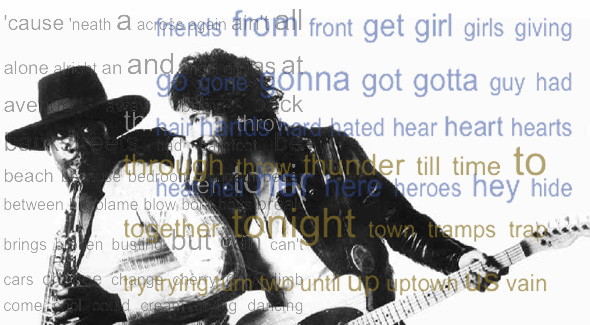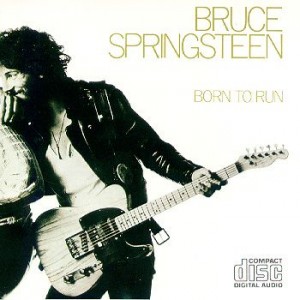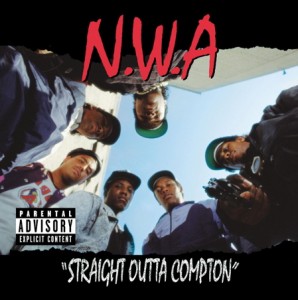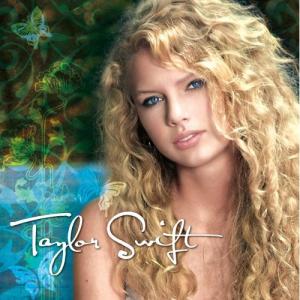Here at Overthinking It, we’re always trying to interpret lyrics of pop songs. Most of the time, in the “Musical Talmud” series, this involves a close reading of the text and a subjective interpretation of the work as a whole.
How old fashioned. Now, thanks to the Internet and the wonders of modern technology, we now have a new tool to help us decipher pop music lyrics: totally unnecessary quantitative analysis.

The idea is to take an entire album’s worth of lyrics, crunch the numbers, see what words turn up most frequently in the lyrics, and compare those words to the common understanding of the overall “meaning” of the album as a whole. For this experiment, I’ve chosen three fairly wordy, non-repetitive albums from three different genres: Born to Run, Straight Outta Compton, and Taylor Swift’s eponymous debut album, Taylor Swift.
First, a note on methodology: I compiled each album’s lyrics and, when applicable, omitted entire choruses that were repeated in their entirety. I fed the text into a free text analysis tool on UsingEnglish.com, which automatically excluded an undefined list of “common words” from its analysis. in addition to those omissions, I excluded contractions such as “I’ll” and “gonna” that appeared in the initial results.
The resulting lists for each album show the top ten most frequently used non-common words in the lyrics and the number of times those words appear in the lyrics.
1. Born to Run by Bruce Springsteen (2,314 words)
- tonight – 14
- backstreets – 11
- hey – 7
- freeze-out – 7
- avenue – 7
- tenth – 7
- thunder – 6
- hiding – 6
- running – 6
- Eddie – 5
In this case, the numbers work out quite well. “Tonight” is an excellent one-word description of Born to Run. With its sweeping tales of desperate escapes and doomed love, “tonight” is both a statement of the time of day that these stories play out as well as the sense of urgency felt by its characters. When does the “meeting across the river” occur? Tonight. When is “everybody out on the run”? Tonight. When are the “streets on fire in a real death waltz”? Tonight. In Jungleland.
How does this method apply to an album that’s even wordier than Born to Run? Quite well, I would argue:
 2. Straight Outta Compton by N.W.A. (7,227 words)
2. Straight Outta Compton by N.W.A. (7,227 words)
- yo – 56
- fuck – 46
- Ren – 38
- shit – 32
- yeah – 27
- Dre – 24
- gangsta – 22
- Compton – 17
- yourself – 17
- express – 16
You may be thinking that “yo” in the hip-hop context is too common of a word to include in this sort of analysis. Nevertheless, it’s telling that by my methodology, “yo” is the most frequently used word on this album, a pioneering work of the “gangsta rap” subgenre. “Yo” is no mere two letter interjection. According to the Wikipedia definition of the term,
“Yo” has also come to be used as an exclamation, usually at the beginning but occasionally at the end of a sentence, often to direct focus onto a particular individual or group or to gain the attention of another individual or group.
This speaks directly to the bravado and swagger expressed on this album. These “Nice Fellas With Attitude” are not shy about directing attention to themselves and their penchant for aggression and violence.
But even if we concede that “yo” is too short/common of a word to be included, then the second most frequent word in the lyrics still serves well to encapsulate the mood of this album.
Such a word would have no place in this final case study, however:
 3. Taylor Swift by Taylor Swift (3,228 words)
3. Taylor Swift by Taylor Swift (3,228 words)
- eyes – 11
- everything – 10
- perfectly – 8
- away – 7
- really – 6
- beautiful – 6
- Tim – 6
- McGraw – 6
- looking – 5
- true – 5
Although Swift’s songwriting has been trashed multiple times on the Overthinking It podcast, she once was described in the New York Times as “one of pop’s finest songwriters, country’s foremost pragmatist and more in touch with her inner life than most adults.” That being said, it’s interesting to note that “eyes” is the most frequently used word in this album, and that for eight out of those eleven instances, “eyes” are used as examples of physical beauty (the other two usages are in the context of eyes rolling and being distant).
Critics could point to this as an indicator of the superficiality of Swift’s songwriting (or journal writing as Wrather would describe it), but that may be too harsh. This album doesn’t pretend to be anything other than an expression of teenage longing and heartbreak, and as parts of the body go, eyes are quite effective at conveying such emotions. More so than those other parts of the body.
Conclusion
Admittedly, I haven’t really proved much beyond showing that word frequency matches pretty well with the intuitive, widely accepted understanding of the meaning behind three fairly straightforward albums. (Okay, I did show that the word “fuck” appears 46 times in Straight Outta Compton, which is an important statistic to have on hand at your next cocktail party.) This should come as no surprise. Still, I think this method could lead to further analysis of more lyrically complex albums such as Pink Floyd’s The Wall or Soulja Boy’s souljaboytellem.com.
Anyone care to guess how many times the phrase “Soulja Boy” appears in souljaboytellem.com, or, dare I ask, what that might mean?
So, I really dig the Born to Run entry. I had a bit of a chuckle at the word used for Jungleland too. Any chance we can get one of these for a Dylan album? Or an R.E.M. album for that matter, if you can discern the lyrics.
Before I followed that Wikipedia link, I assumed “yo” as English slang and the Japanese “yo” were etymologically related. You learn something new every day, but how often do you unlearn something wrong?
Anyway, I loved this article. We had to use this sort of analysis for Shakespeare in English class in college, and it’s amusing to see it applied to pop-culture. I think that, in addition to “yo” being a bid for attention, the fact that “Dre,” “Ren” and “Compton” show up so frequently says something about hip-hop’s very self-conscious character.
The question with Soulja boy is what counts as a chorus. If you get rid of the brute repetition, you get rid of the song entire.
Counting all the choruses seperately, I got:
Watch 78
Me 76
Crank 55
Dat 53
Soulja 52
Boy 52
now 44
you (ahem, YOOOOOOOUUUUU!!!) 37
Ho 25
Watch..me..crank..dat..soulja..boy..now..you..hoe…..HAHAHA i think that IS his entire album
Speaking of “yo,” does anyone remember “Yo! MTV Raps”?
http://en.wikipedia.org/wiki/Yo!_MTV_Raps
And speaking of learning something new, apparently this show featured a “Doctor Dre” that of course was not the Dr. Dre of NWA fame.
Tim – 6
McGraw – 6
I found this endlessly amusing for some reason but also kind of wierd. I don’t know the context but how many times are you going to directly mention a specific celebrity in your album? Though I’m also wondering why I find this less acceptable than the 24 mentions of Dre. But I guess with old school rap (I’m guessing that’s what it is from the album) mentioning Dre is like a necessary hommage, like praying to Mecca or something.
@Marmaduke: The song “Tim McGraw” contains all six instances of the name popping up. Lyrics:
You said the way my blue eyes shined,
Put those Georgia stars to shame that night
I said: “That’s a lie”
Just a boy in a Chevy truck,
That had a tendency of gettin’ stuck,
On backroads at night
An’ I was right there beside him all summer long
An’ then the time we woke up to find that summer’d gone
But when you think: Tim McGraw,
I hope you think my favorite song
The one we danced to all night long:
The moon like a spotlight on the lake
When you think happiness,
I hope you think: “That little black dress”
Think of my head on your chest,
An’ my old faded blue jeans
When you think Tim McGraw,
I hope you think of me
September saw a month of tears,
An’ thankin’ God that you weren’t here,
To see me like that
But in a box beneath my bed,
Is a letter that you never read,
From three summers back
It’s hard not to find it all a little bitter sweet,
An’ lookin’ back on all of that, it’s nice to believe:
When you think: Tim McGraw,
I hope you think my favorite song
The one we danced to all night long:
The moon like a spotlight on the lake
When you think happiness,
I hope you think: “That little black dress”
Think of my head on your chest,
An’ my old faded blue jeans
When you think Tim McGraw,
I hope you think of me
And I’m back for the first time since then:
I’m standin’ on your street,
An’ there’s a letter left on your doorstep,
An’ the first thing that you’ll read:
Is: “When you think: Tim McGraw,
“I hope you think my favorite song”
Some day you’ll turn your radio on,
I hope it takes you back to that place
When you think happiness,
I hope you think: “That little black dress”
Think of my head on your chest,
An’ my old faded blue jeans
When you think Tim McGraw,
I hope you think of me
Oh, think of me,
Mmmm
You said the way my blue eyes shined,
Put those Georgia stars to shame that night
I said: “That’s a lie”
________
As has been said, Taylor’s songs are, basically, high school poetry. Taken as this, it makes sense for her to choose a currently popular fellow country singer as a poetic device in one of her love songs. The implication is, of course, they were dancing to one of his songs the night they fell in love, so she’s telling the person she is singing to that she hopes when he thinks back on her, he has positive memories, regardless of anything negative that may have gone on between them; and she uses McGraw as (how Fenzel would put it) a form of metonymy (or is synechdoche better?) for the entire set of memories. She’s putting her eggs in the basket of hope that her listeners will be able to associate their own lives with this, for teenagers aren’t the only ones that are “reminded” of some aspect of their lives “every time” they encounter something they have somehow, for some reason, associated with that aspect in their minds. Smells, sounds, sights, songs- being exposed to one can open a floodgate of memories if the connection and memories are strong and powerful enough. Swift’s hope is that when his memories are triggered by McGraw, the young man she danced with will be happy about them.